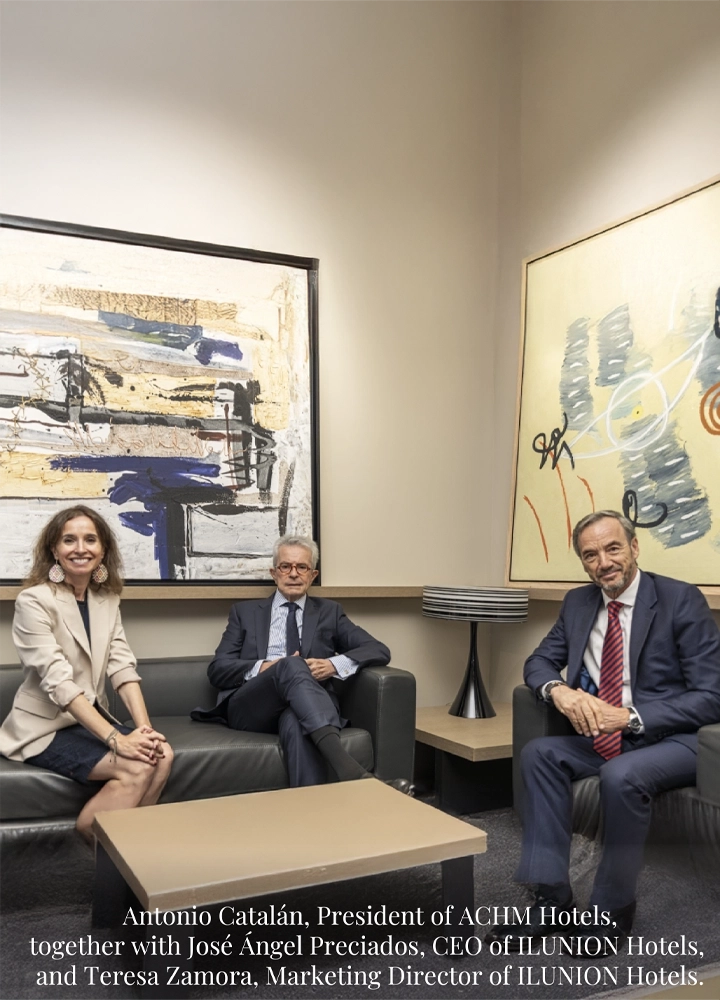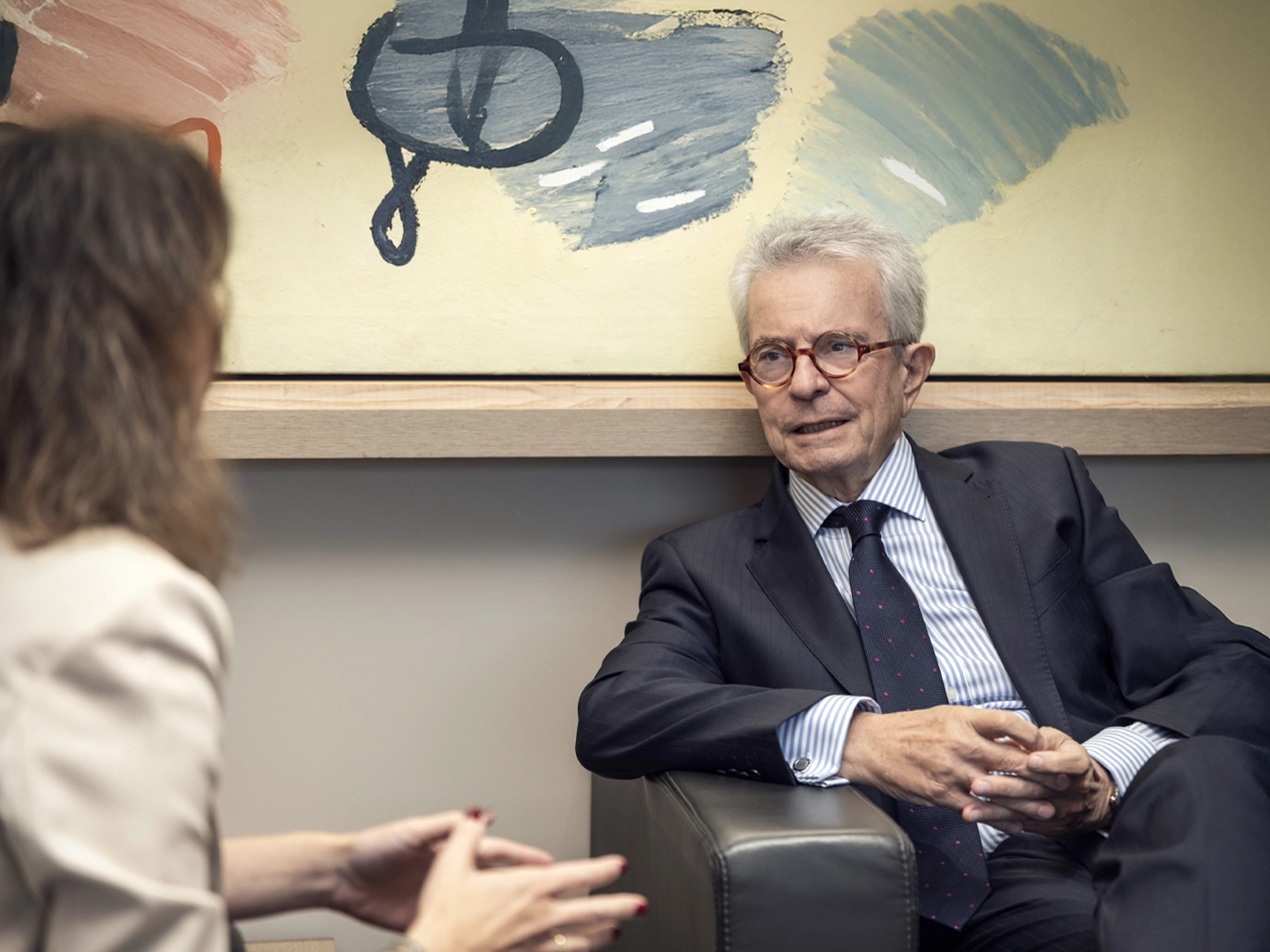
A coffee with: Antonio Catalán
Antonio Catalán, President of ACHM Hotels by Marriott
Interview with Antonio Catalán, by Teresa Zamora.
September 25, 2025
A “well-utilized mediocrity,” that’s how Antonio Catalán defines himself, a heavyweight in business and an institution within the tourism sector, a sector in which he has been for almost 50 years. “I have lived through all the stages of tourism in Spain: first with NH, then with AC, and now with ACHM Hotels by Marriott … My formula for success: 33% intelligence, 33% luck, and 100% work. But luck, in my life, has been decisive.”
Antonio, looking back, what are you most proud of?
Of almost everything. I am a born optimist. I believe that both successes and mistakes serve as learning experiences. If it goes wrong, you learn what not to do; if it goes well, you learn what to repeat. I have steered the course, but the credit belongs to the teams. This is a business of people for people, and I have always had dedicated and committed teams.
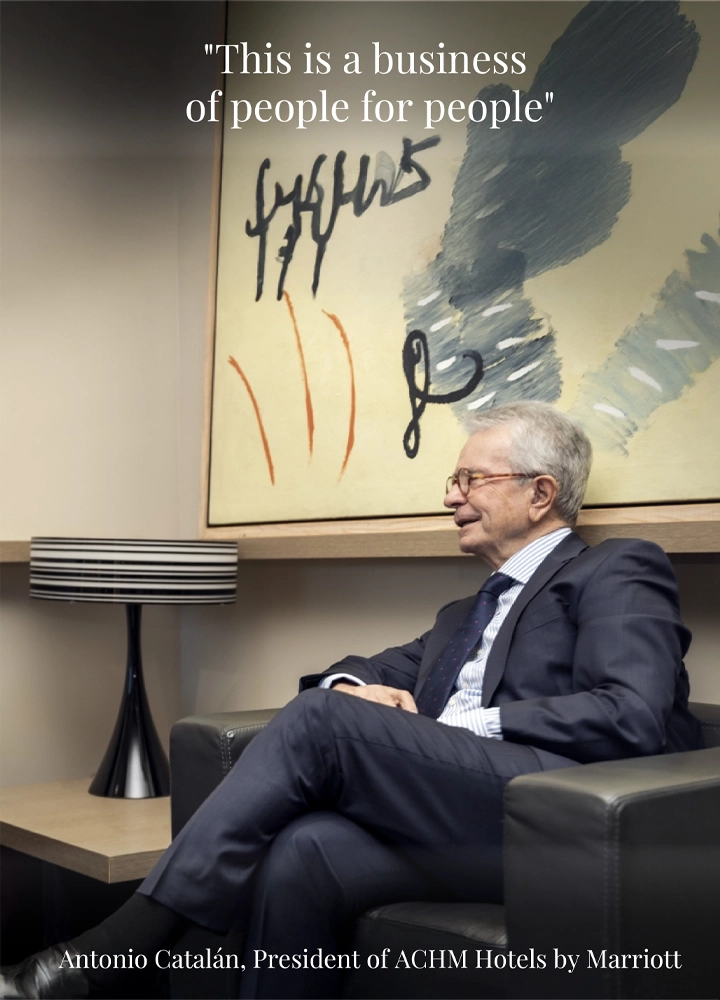
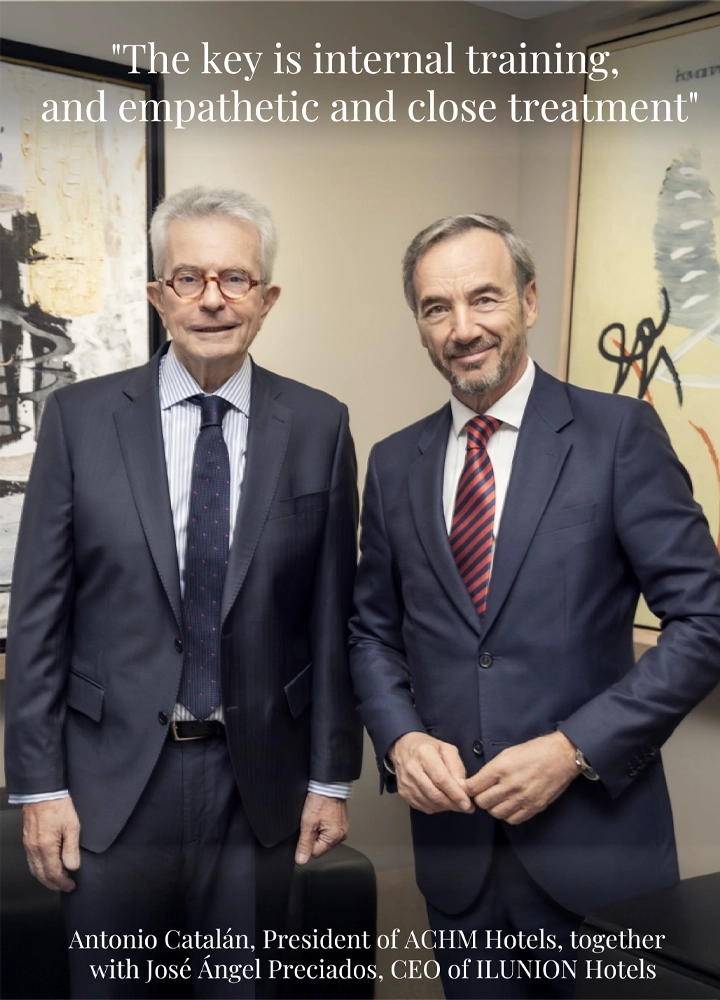
This is a business of people, but how has the sector changed from when you started until today?
The physical part of the hotel has practically not changed: there’s a bed, a bathroom, a restaurant, and basic services. That remains the same since I started in 1978, when we hired a very young José Ángel Preciados, your CEO. What has evolved a lot is the commercialization and the formulas of the sector.
Before, everything was traditional hotels: three, four, or five stars. The difference was in the room size and similar details. Today, however, the concepts are different because the world has also changed. When I finished my degree, I hadn’t flown; I took a plane for the first time at 23. My children had flown before their First Communion. People travel much more, and the age range of those who use hotels has broadened. For me, today there is luxury… and then, all the other concepts.
How has the international hotel market evolved?
When I first went to New York, I stayed at a Hilton. Back then, Hilton was Hilton, Marriott was Marriott, Hyatt was Hyatt. Each group had a single brand. Today, Marriott has 34 flags (brands) and is approaching 40. Many overlap, but they respond to different distribution and territory strategies. Before, however, they would give you an area with one brand, and right next to it they would put another with the same commercial channel.
You have worked with big groups, what did your alliance with Marriott mean?
It was decisive. After the 2008 crisis, the situation became difficult, and at that moment, Marriott appeared. Many people told me: “What foresight you had in partnering with the number one international group!” And the reality is that it was a mix of opportunity and luck.
I remember their worldwide vice president came to see me. They wanted to buy us, but I proposed a 50/50 partnership. A week later, they called me to go to Washington to see Mr. Marriott, and right there, over lunch, we closed the deal: they gave us 150 million for 50% of the brand. It was a key moment that allowed us to grow. Today we have more than 100 hotels open or in development across Spain, Italy, and Portugal.
You’ve mentioned the importance of teams several times. What is your philosophy in this regard?
The key is internal training, and empathetic and close treatment. Most of our directors started with us from the bottom. We have barely hired people from outside. Everyone calls me ‘Presi’ (Prez), even one of my children. There is a very natural and special relationship, fostered by the company’s management, which means that if someone gets sick, for example, we try to help them with a second opinion; or if someone loses their car as a result of the DANA (severe weather event), they are provided with another one within 15 days. In the end, all of this generates a pride of belonging to “something interesting.” Working at AC cannot be the same as working at any other company, just as belonging to ILUNION Hotels is not the same as belonging to any other hotel company. I always say that this is not a business of mathematics or artificial intelligence; it is a business of people. Motivated teams make the difference.
What are the main social challenges that concern you?
One is access to housing. In my time, we got married, bought an apartment, and worked 14 or 16 hours to pay for it, but you paid it off. Today, young people cannot, and we are facing the best-prepared generation I have ever known. Tourist apartments are spoken of as a problem, but the reality is that Madrid needs 200,000 homes. I don’t understand why land cannot be reclassified and construction started immediately. Without housing, it is impossible to form families.
Another great challenge is healthcare. Aging and increased life expectancy are saturating both public and private systems. I believe Spain should decisively commit to biomedical research. We have the talent for it—people with training, expertise, and gifts who, on many occasions, have to emigrate.
What role does technology play in the hotel business?
Our business is not high-tech; it’s common sense. The daily operation will always be making beds, serving meals… adapting to the lack of waiters or the need for consecutive shifts in cities like Madrid. Ultimately, it’s about applying common sense and flexibility.
However, we do have to leverage tools like artificial intelligence in key areas such as revenue or commercialization.
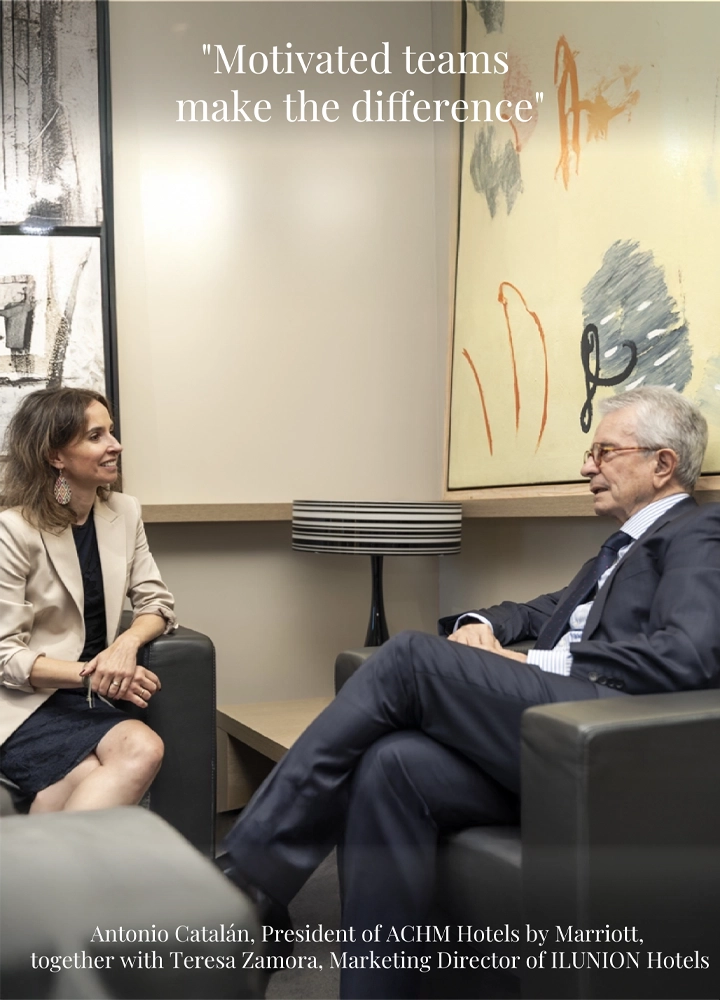
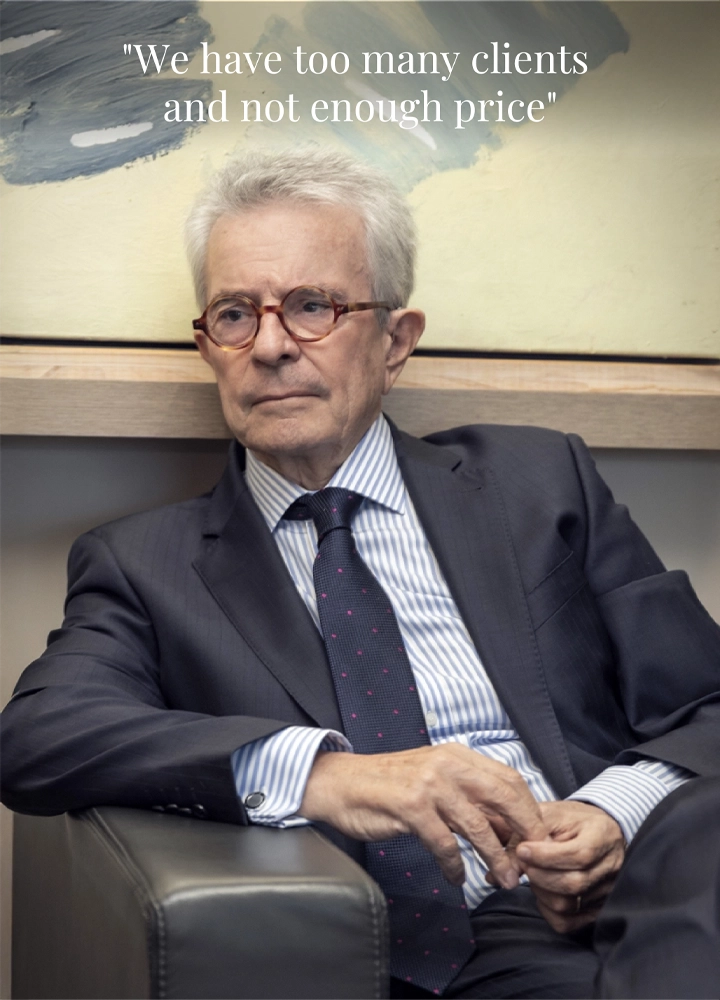
How has hotel marketing changed?
It used to be much simpler. Today it’s another world: social media, segmentation, positioning, revenue management… Booking, for example, is a genius: it concentrates 90% of hotels. Many owners complain, but they don’t do anything else. And today, you either pedal every day, or you fall off…
With your experience and years of life, you are more than justified in talking about how you see tourism in our country. What do we lack, what do we have too much of, what would you change?
We have too many clients and not enough price. I am clear that this is the case. A hotel, like a hotel chain, like a city or a country, is the same: occupancy/average price. I would stop “breaking records” and change a certain client profile. There must be different hotels for different clients and there must be a broad offer, but not everything can be accepted, because it doesn’t add up. It detracts. In the end, if you have price, you can raise salaries, improve contracts, improve service… if you have price, everything is real.
How do you see the future of the Spanish tourism sector?
It has been an exemplary sector. People who started from scratch built powerful companies, then conquered the Caribbean, and today are global leaders. If we added everything our companies generate abroad to the Spanish GDP, we would not be at 13%, but at 18 or 19%. We have a generation of hoteliers with a spectacular merit, and new generations who are trained and have languages who will follow that path.
To finish, what key takeaway do you leave after your entire career?
After so many crises, I no longer have obsessions. In rankings, I have already been the number one hotelier in Spain, now I compete in Europe… but there will always be someone bigger. The important thing is that we have built solid companies and prepared teams.
And, any advice for ILUNION Hotels?
Advice! I would take advice from ILUNION Hotels for us. It is an unstoppable trinomial between a new generation of ONCE, along with Alejandro Oñoro and José Ángel Preciados, from which we all have to learn. A true example of a company.
